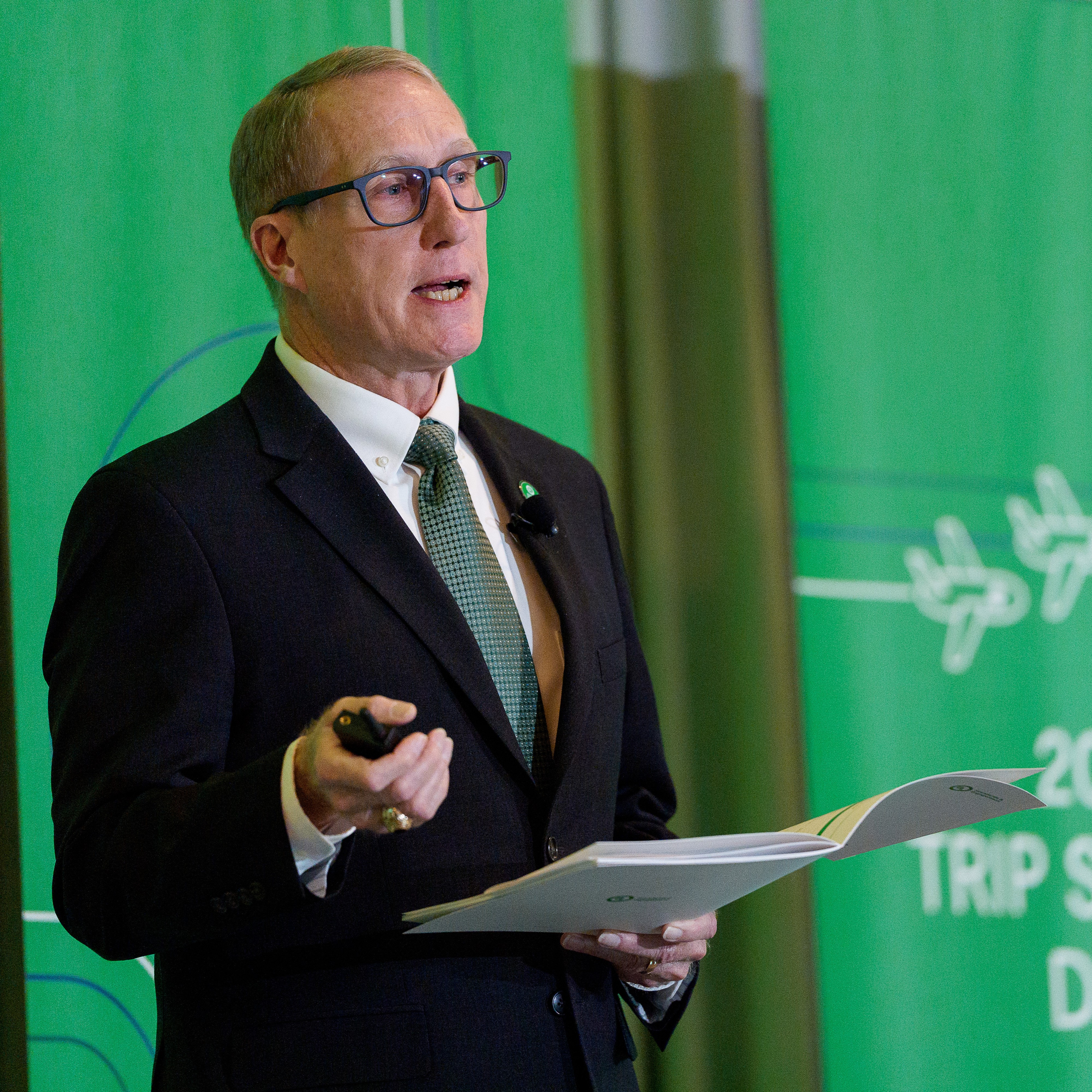-
News
November 1, 2024
Advancing Lithium Battery Safety in Aviation: 2024 TRIP Summit DFW

Photo: Michael Moenning Photography
Although aviation consistently ranks as one of the safest forms of travel, there is a growing issue today that threatens that safety — overheating batteries in rechargeable electronics, which can lead to fire and explosion.1 Also known as thermal runaway, this issue is relatively infrequent in air travel, with 1.5 incidents per 100,000 passenger departures, yet experts agree that it must be addressed to keep the skies safe.
On October 22-24, passenger and cargo airline industry professionals — including dangerous goods and hazardous materials experts, pilot unions, cabin safety professionals, manufacturers, passengers and cargo operators, regulators, and more — came together at the Dallas Fort Worth International Airport to share and discuss data, insights, and mitigation strategies for thermal runaway incidents in air travel at UL Standards & Engagement’s 2024 TRIP Summit DFW. The summit is a regular event that convenes members of the ULSE Thermal Runaway Incident Program — a secure, voluntary system for passenger and cargo carriers to voluntarily report and track incidents, and share insights to solve for risk.
This third installment of the summit featured presentations from TRIP members, regulators including the Federal Aviation Administration and the FAA Tech Center, pilots, the
International Air Transport Association, freight shippers, and ULSE staff members. Topics included TRIP data, battery and aviation safety standards, aviation safety management systems, strategies for education and outreach, and insights on passenger awareness and behavior, as well as cabin crew perceptions and training.
TRIP Data and Insights

Photo: Michael Moenning Photography
In opening the conference, UL Standards & Engagement Director of Technology & Systems David Wroth discussed insights emerging from TRIP data, including incident rates, as well as trends by time of year, device type, location, phase of flight, and device activity.
In September, ULSE publicly shared findings from TRIP for the first time since its 2019 founding in the report, Lithium-Ion Battery Incidents and Their Impact on Aviation Safety. Wroth discussed many of these data points, including the passenger departure incident rate, which has increased steadily in the past five years to a current rate of 1.5 incidents per 100,000 flights.
“At first we were looking at the data and asking, ‘Do we have a problem? How big is the problem?” Wroth said. “Now we’re making the turn and asking, ‘What actions can we take that actually mitigate the problem?’”
Passenger Awareness and Behavior
In addition to tracking incidents through TRIP, ULSE has also been conducting passenger insights surveys, gathering information on passenger awareness regarding the risk of fire from rechargeable electronics and behaviors that contribute to the risk. ULSE Director of Insights & Policy Analysis Sayon Deb presented data from these studies, including The Impact of Public Awareness Gaps Around Lithium-Ion Batteries in Air Travel, emphasizing the large percentage of passengers who admit to not knowing about the risk, and discussing opportunities to raise awareness.
“Our data shows that 44% of U.S. consumers admit to knowing nothing about lithium-ion batteries, and that is a staggering number — considering how ubiquitous these devices have become,” Deb said.
Despite nearly half of passengers admitting to being unaware of the safety risk, Deb clarified that passengers are not complacent:
“Passengers want to be good citizens. They want to be educated,” he said, sharing video testimonials of passengers interviewed by ULSE. “It’s not that they truly don’t care – it’s either just that there’s too much chaos to pay attention in an airport, or the points of intervention and education are not at the right moments. It’s less of an issue of ignorance and more an issue of reaching them where they are.”
Finding Solutions
Presenters and attendees participated in several open discussions on strategies for increasing passenger awareness and encouraging safe behavior, such as not packing rechargeable electronics in checked luggage, keeping devices within arm’s reach, and notifying flight attendants if electronics are dropped or if they fall into a seat. Throughout each discussion resonated the common goal of mitigating risk and increasing safety.
“UL Standards & Engagement extends a sincere thank you to all TRIP participants,” Wroth said. “We deeply value your expertise and commitment to keeping the skies safe.”
If you are interested in participating in ULSE’s Thermal Runaway Incident Program, please visit myTRIPportal.org.
What Is Thermal Runaway?
While efficient and widely used in rechargeable electronics, lithium-ion batteries can slip into thermal runaway if damaged, improperly charged, poorly manufactured, or counterfeit. Thermal runaway is an uncontrollable, self-heating state that can lead to smoke, fire, toxic off-gassing, or explosion.
- 1Source: https://news.mit.edu/2024/study-flying-keeps-getting-safer-0807